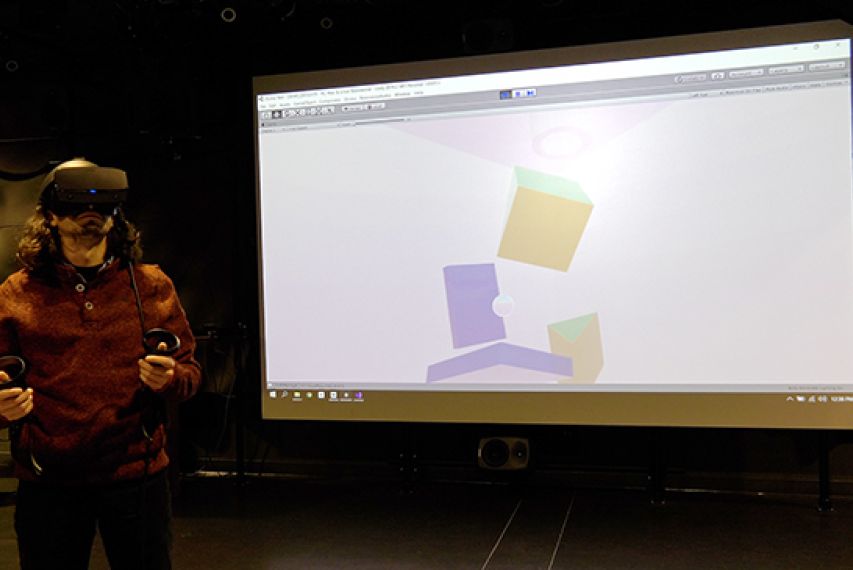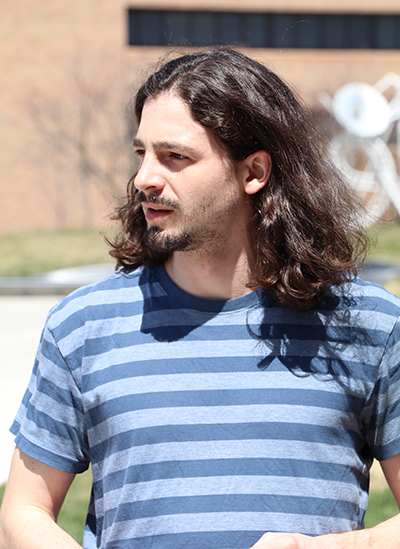Matias Vilaplana Stark is a doctorate student in McIntire Department of Music at the University of Virginia. An international student from Santiago, Chile, he has collaborated with many visual artists and dancers in creative projects which has led him to delve deeper into interaction and performance in virtual space.
Tell us about your journey to get to UVA.
Stark: Before coming to the US, I was working in a recording studio in Santiago, Chile. I graduated from the sound engineering program at Universidad de Chile and as I was developing in my professional career as a sound engineer, I started collaborating with visual artists and dancers in projects as an electronic music composer. My experience collaborating in the interactive dance project Emovere, led by Universidad de Chile faculty Javier Jaimovich and Francisca Morand sparked my interest in sound/dance interactive systems.
I came to the US in 2017 to do a masters in the Media Arts program at the University of Michigan. I met Professor Luke Dahl (from UVA) there, when he demoed an interactive system for movement and sound that he had been developing using motion capture.
We clearly had similar interests and I decided to apply to the composition and computer technologies (CCT) PhD program at UVA.
I moved to Charlottesville in the middle of the pandemic. It was rough at first, but I was still able to meet my fellow students (in outdoor gatherings of course). After navigating the past year (somewhat successfully in my opinion), I can now take full advantage of being in person and having access to the university resources.
How did you get interested in your field of study?
Stark: In my family no one really played an instrument or knew much about music, so I never understood much about it in school. At some point, I started playing bass at a friend's house, we were learning Nirvana songs. I realized that I wanted to work on and with music, but not necessarily live off performing or composing.
After college, I worked for 4 years in a recording studio and was also composing for different interdisciplinary projects, eventually I grew tired of the work in the studio and wanted to dive deeper into interactive systems. I dreamt of being able to make music with movement, to sculpt sounds with my hands and body.
In my time in the US, I’ve had the opportunity to experiment and become familiar with different motion tracking technologies. Here at UVA, we have a Music Interaction Lab (MIL), located at Wilson Hall, with a motion capture technology rig that allows full body motion tracking. Lately, we’ve been working on integrating virtual reality equipment into the mix, opening new possibilities for interaction and performance in virtual environments.
How has it been transitioning from a completely virtual UVA experience to in-person?
Stark: It feels that this is my first year in the program, I’m finally making use of all the great resources on Grounds, mostly the Music Interaction Lab, the makerspace, and the Jefferson Starship Studio, all located at Wilson Hall.
I’m glad we can have classes in person again, I missed being in a room with people last year. Also, being able to simply run into the other students in the program makes things feel real, to have the chance to say: “let’s go get lunch”. Some topics in class worked very well online but collaborating in that medium can also be very difficult.
Especially with music and other arts, sharing a space, to hear and see each other, is fundamental for music making. Interesting and exciting discussions emerged while teaching or taking online classes, but once you close the virtual call it just felt as if none of it had been real and you were “alone” all this time. I found that shocking.
What is a piece of advice you would give to a new international student?
Stark: Meet other international students that have been around for longer and learn from their experience, I found that to be very helpful in my process of adapting and enduring any cultural shock. From there on, to meet as many people as you can. One of the benefits of being in a place like this is that you’ll find people from all over the world, with radically different life experiences and backgrounds, and the value of that cannot be measured.





